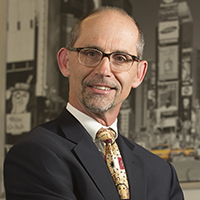Launching Your Planning Career: A Guide for Idealists
The planning profession is rooted in the optimistic idea of betterment: transforming communities from the ground up to achieve livability, sustainability, and social justice. Attaining this entails a healthy measure of idealism. However, it also requires that young planners are realists, prepared for long timeframes, ethical dilemmas, warring stakeholders, and red tape.
For young planners, facing these obstacles unprepared can be deflating or, worse, disillusioning.

Richard Willson, FAICP, drew on his years of experience in the classroom, as a researcher, and as a mentor to young planners. His insights provide processes for making choices in the career "launching" phase — addressing decision-making, doubt, types of work, and work settings.
This blog series is amplified in Richard Willson's books, A Guide for the Idealist: How to Launch and Navigate Your Planning Career, and Reflective Planning Practice: Theory, Cases and Methods. The books include frameworks, case studies, reflective methods, advice, and personal anecdotes. They are available at Routledge, Amazon, and most retailers.
"A Guide for the Idealist" Posts
Making Strategic and Ethical Practice Choices
February 25, 2022Reflect | Act | Release
October 18, 2021Reflection Reset: Pathways to Effective Practice
January 15, 2021Reflection for Radical Planners
November 13, 2020Reflective Planning: Navigating Idealism and Realism
August 18, 2020Being an Idealist in Difficult Times
July 27, 2020Changing Planning Practices to Honor George Floyd
May 29, 2020Cultivating Planning Career Resilience
January 10, 2020Reflex or Reflexivity: Which One Is Good for Planners?
December 13, 2019Spinning Planning Experience into Practical Wisdom
October 15, 2019Time Triage for Planning Managers
August 6, 2019Negotiation Skills Are a Must for Planning Managers
July 9, 2019First-Time Planning Manager? Let Go, Step Up
April 8, 2019Career Ordeals Await — You Can Build Resilience
February 11, 2019Do You Plan With Caution or Courage — or Both?
Did I Take the Wrong Job?
October 16, 2018I'm an Underworked Planner and I'm Losing Heart
September 12, 2018Tips for the Overworked Planner
August 13, 2018The Workplace Conspiracy Against Change
July 24, 2018Reframing Anxiety
July 10, 2018Moving Into Planning Management
June 5, 20187 Answers to Questions About Mentoring
May 16, 20185 Scenarios for "Reading" Your Supervisor
May 1, 2018Finding Your Way to the Best Planning Job
March 27, 2018Trust: A Must-Have for Credibility, Influence, and Power
March 6, 2018Credibility, Influence, and Power: How to Get It, How to Use It
January 9, 2018Theories of Change and Your Planning Career
November 28, 2017Planning Theory: What Is It Good For?
October 31, 2017Mentoring and the Planning Fountain of Youth
September 11, 2017So ... No Planning Degree?
In Memoriam: Rick Willson, FAICP
Guide for the Idealist Creator
Richard Willson, FAICP, professor, consultant, author, artist, and lifelong mentor to many in the field, died unexpectedly on December 6, 2022. He was 66.
Willson was a professor in the Department of Urban and Regional Planning at Cal Poly Pomona. He served as department chair, interim dean, and academic strategic planner. Willson's research addresses planning theory and practice, parking policy, and climate change planning.


